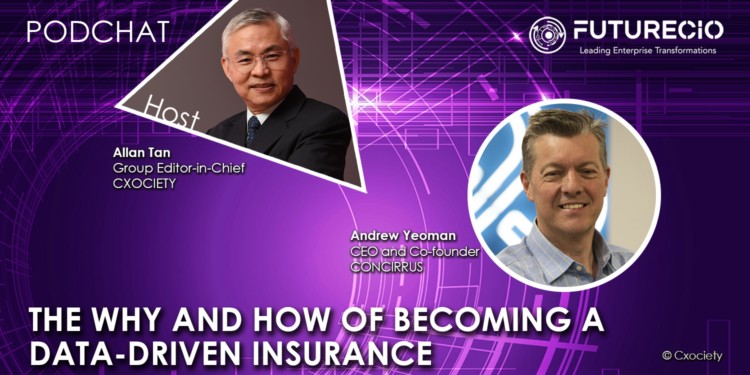As the world pivots and adjusts to a pandemic environment, the disruption that has impacted business has driven many organisations to re-structure and re-calibrate their operating models. According to the OECD, insurance companies experienced a slowdown in gross premiums underwritten in 2020, with life insurance premiums declining by 2.2%. Non-life grew by 1.2% in 2020.
The volatility and disruption post the pandemic has highlighted the need for insurance for businesses and individual alike. Customers today are becoming well educated about the value of insurance, especially enterprise insurance for businesses.
Delivery of insurance needs to change
Andrew Yeoman, CEO and co-founder of Concirrus, believes that insurance remains relevant today as it was hundreds of years ago. He further believes that awareness of the value of insurance is not in question. What is, however, is the type of insurance needed by the buyer and when it is needed.
He also sees the emerging market of the Internet of Things (IoT) that will influence how insurance is consumed and delivered. He noted that IoT devices hold data that describes a behaviour – information even better as an indicator of risk than static factors that have been used previously.
He illustrated this in the shipping industry where static information such as the age of the vessel and the flag it represents do not provide as much value as what data derived from IoT can provide.
For Yeoman, data from IoT describes the behaviour of these vessels – how, where and when they are used.
“I can see what their behaviour is and start to make decisions based on that behaviour. Our belief is the behaviour is intrinsically a better indicator of risk than the delicate static demographic factors that have previously been used,” he called out.
Insurtech and the future of insurance
Citing a BCG study, Yeoman commented said the report predicted the digital insurer of the future will have 50% fewer people than a traditional insurer today.
“Today there are trillions of dollars tied up in every insurer’s back end. They are legacy processes, legacy data, legacy technology legacy thinking,” he continued.
The introduction of data from IoT coupled with technologies like artificial intelligence and machine learning, together into contemporary processes.
“Doing so will release cost savings – may be up to 50% savings that BCG talks about is captured in thousands of tiny places within an insurance organisation. It means that there's going to be new data, it means that every actuary going forward is going to be a need to be a data scientist just to deal with the volumes of data.
“It means that every decision needs to be powered by an aggregate knowledge that exists within an organisation. The future (of insurance) is digital. In five to 10 years, the risk is going to be assessed algorithmically. It will be traded digitally,” prognosticated Yeoman.
He acknowledged that insurtechs are disrupting the market because they don’t have legacy systems and processes.
“I think they're going to bring about a new a new way of working, which I think is great for the entire industry,” he added.
He also quipped those insurers move in two speeds: slow and stopped. “We're fortunate we're in a dead slow phase at the moment,” he opined.
Greater dependence on data is good
Yeoman believes that the industry is entering a period where people need to share more data.
Previously, brokers knew more than the insurers, who knew more than the reinsurance brokers. There was this declining data dependency that cascaded through the chain.
“Now we have an abundance of data. Everybody has the same data. It's making us re-evaluate the relationships. We are seeing communities come together around a common understanding of data. They will operate differently."
Andrew Yeoman
“I foresee that there's going to be a split in the market. There'll be a digital market, and then there'll be an analogue market, and the digital market will have a shared understanding of the risk. The analogue market will be pockets where people want to develop proprietary knowledge. They're two different markets, they will have different prices, or they'll have different efficiencies,” he elaborated.
He is certain this new era will be an interesting time again for the industry.
New opportunities
Yeoman believes there is a massive opportunity to create new services with embedded insurance. The high levels of personalisation will mean insurers have to operate more efficiently. For the buyer, it will spell more effective coverage.
“The (insurance) product is going to be data-driven. It is going to be convenient to buy. It is going to be convenient to pay (as in the event of a claim). I can't think of anything more exciting than building those products for future generations,” concluded Yeoman.
Click on the PodChat player and listen to Yeoman describe the changing insurance landscape and how data will be central to staying competitive in the digital, post-pandemic insurance landscape.
- The insurance industry has been in business for hundreds of years. To continue for hundreds more, what needs to happen?
- We’ve seen disruptions caused by insurtechs. Are current business models still relevant?
- Insurers have a reputation for being slow in adopting new ideas. Do you see this behaviour changing in terms of how principals, brokers and agents operate?
- Insurance is a relationship business, more so at the higher value products. At these levels, it’s often normal for agents to want to keep this relationship a secret. Should agents and brokers be more willing to share their customer data, and how will this benefit them moving forward?
- What key trends do you see will continue to impact insurers both at how they plan, create products and execute their business models, and how they engage with their customers?




